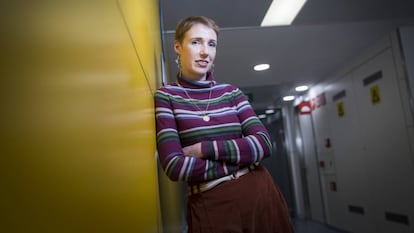British woman who got lost in snow revived after six hours in cardiac arrest
Audrey Mash and her husband became stranded in a storm while hiking in the Catalan Pyrenees in November. Doctors are calling the case “exceptional on a global scale”

“I can’t remember anything about that weekend,” said Audrey Mash, a 34-year-old British woman who was revived by Spanish doctors after spending more than six hours in cardiac arrest. The woman, who works as an English teacher in Barcelona, lost her husband on November 3 in the mountainous area of Vall de Núria, in the Catalan Pyrenees in Girona. Having been caught off guard by a snowstorm, Mash suffered hypothermia, falling unconscious before entering cardio-respiratory arrest. Six hours later, having been rescued, she was finally revived in the Vall d’Hebron hospital thanks to the coordinated efforts of the fire service, the Medical Emergency Service (SEM) and the staff at the hospital.
“This is an exceptional case on a global scale,” Eduard Argudo, a doctor from the Vall d’Hebron hospital, said at a press conference on Thursday. “It is the longest cardiac arrest ever recorded in Spain.”
This is the longest cardiac arrest ever recorded in Spain
Dr Eduard Argudo, Vall d’Hebron hospital
Thanks to a number of clues – including phone calls and photos that had been received by the couple’s friends – a fire crew managed to reach the area where the pair were lost at around 3.40pm. The woman, who at that moment was registering a body temperature of 18ºC, was taken to the Vall d’Hebron hospital via a medical helicopter. On arrival at 5.44pm, the patient was put on an extracorporeal membrane oxygenation (ECMO) machine, which does the job of the heart and lungs by extracting blood for oxygenation before sending it back into an artery. The blood is also warmed during the process, helping to increase body temperature.
When Mash arrived at the hospital, she had no vital signs, her heart was showing no electrical activity and her kidneys and lungs were not functioning. The medical personnel, however, believed that she could survive if her hypothermia was treated, which is why they decided to connect her to the ECMO machine. When her body temperature reached 30ºC, the doctors decided to defibrillate her in an attempt to revive her, but this did not work. Her heart began to beat autonomously once more at 9.46pm.
“This case sets out the route for the future: coordination between teams,” said Miquel López, the head of the fire service’s special division, speaking this morning at a press conference at the hospital to explain the details of the case. “These coordination efforts have a key impact: without them there are no professionals able to deal with cases such as this one,” added Antoni Encinas, the head of the intensive medical service.
Mash is not presenting any symptoms of neurological damage, and has made an almost full recovery, apart from sensitivity and a lack of movement in her hands, which were affected by the cold. She has been able to return to a normal life.
I didn’t realize that my life was in danger until I found myself here
Patient Audrey Mash
Speaking today at the press conference, Mash’s husband, Rohan Schoeman, provided more details about their excursion.
“We went to spend the weekend with friends,” he said. “On Sunday we decided to leave the hut early, at 7.15am, without them. At one point, the snowfall became very heavy. We found a rock and we tried to use it for shelter to avoid the adverse weather conditions. Once the visibility improved, I could see that our friends had tried to contact us. Audrey was losing consciousness so I tried to send some photos to our friends of where we were.”
“I didn’t realize that my life was in danger until I found myself here,” Mash said about waking up in the hospital, from which she was discharged 11 days later. “The medical attention has been fantastic.” She added: “Perhaps we weren’t as prepared as we should have been, we were careless.”
English version by Simon Hunter.
Tu suscripción se está usando en otro dispositivo
¿Quieres añadir otro usuario a tu suscripción?
Si continúas leyendo en este dispositivo, no se podrá leer en el otro.
FlechaTu suscripción se está usando en otro dispositivo y solo puedes acceder a EL PAÍS desde un dispositivo a la vez.
Si quieres compartir tu cuenta, cambia tu suscripción a la modalidad Premium, así podrás añadir otro usuario. Cada uno accederá con su propia cuenta de email, lo que os permitirá personalizar vuestra experiencia en EL PAÍS.
¿Tienes una suscripción de empresa? Accede aquí para contratar más cuentas.
En el caso de no saber quién está usando tu cuenta, te recomendamos cambiar tu contraseña aquí.
Si decides continuar compartiendo tu cuenta, este mensaje se mostrará en tu dispositivo y en el de la otra persona que está usando tu cuenta de forma indefinida, afectando a tu experiencia de lectura. Puedes consultar aquí los términos y condiciones de la suscripción digital.








































